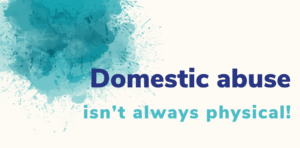Coercive Control: What is it?

There are many forms of domestic abuse, including:
- Physical
- Financial
- Coercive and controlling behaviour, and gaslighting/ emotional
- Sexual
- Digital/ online
- ‘Honour’-based
- Forced marriage
- Female Genital Mutilation (FGM)
This blog is concentrating on coercive control because it is important that everyone understands what it is.
What is coercive control?
Coercive control is a criminal offence under the Serious Crime Act 2015. We can support you if you are experiencing this abuse.
Coercive control is controlling and coercive (measures that are intended to force people to do something they do not want to do) behaviours that fall under the category of emotional abuse.
- Coercive: It is an act or a pattern of acts of assault, threats, humiliation, intimidation, or other abuse that is used to harm, punish, or frighten their victim.
- Controlling: Behaviour that happens when someone sets out to make the victim dependent upon them by cutting them off from support networks, exploiting them, regulating their everyday behaviour, and depriving them of their independence.
The difficulty with coercive control is that the perpetrator creates invisible chains and instils a sense of fear on their victim, making it difficult for them to leave a relationship. Here are some examples of coercive control behaviours:
- Consistent criticism
- Monitoring/ checking up on a victim’s actions and what they are doing
- Isolating from friends and family
- Depriving of basic needs, such as food
- Gaslighting
- Depriving access to support services, such as medical
- Controlling everyday life, such as where and when the victim can go somewhere, who they can see, what they can wear, and when they can sleep
- Withholding money and controlling finances
- Humiliating, degrading, or dehumanising their victim
- Blackmail and making threats
If you have or are being affected by coercive control or you want to discuss your situation, please get in touch with us by calling 01623 683 250 or email us at [email protected].
If you need support outside our office hours, please contact:
- 24-hour helpline for Nottinghamshire on 0808 800 0340
- If you live outside the local area, you can contact the 24-hour National Domestic Abuse Helpline run by Refuge on 0808 2000 247
Further reading
Women’s Aid wrote an article for The Telegraph if you would like to learn more about coercive control.
Signs of domestic abuse – read our blog to learn more about domestic abuse and the signs to look out for.
Learn about the impact that domestic abuse has on the family on our blog.
Our services
Learn about our services, what we do, and how we can support you or someone you know here: